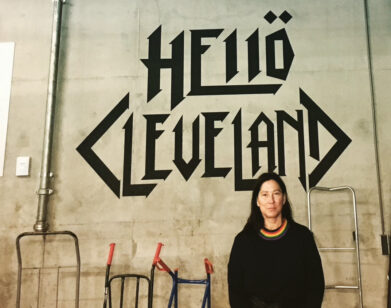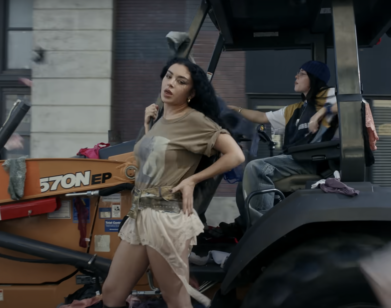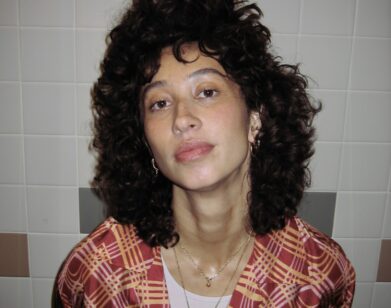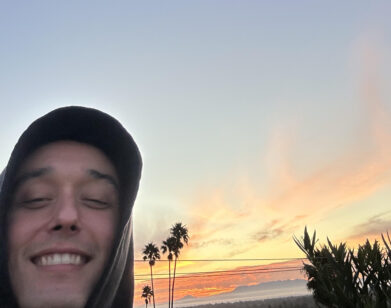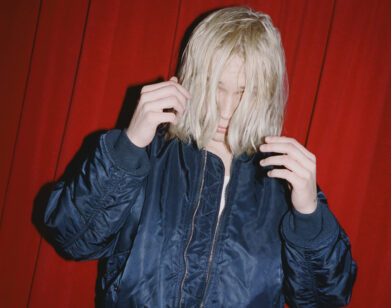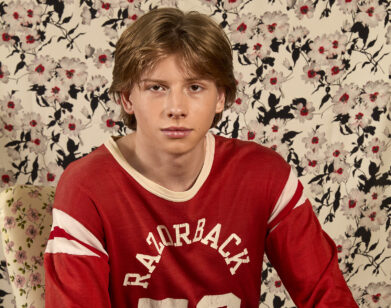Exclusive Video Premiere: ‘Human Animal,’ The Golden Hippie
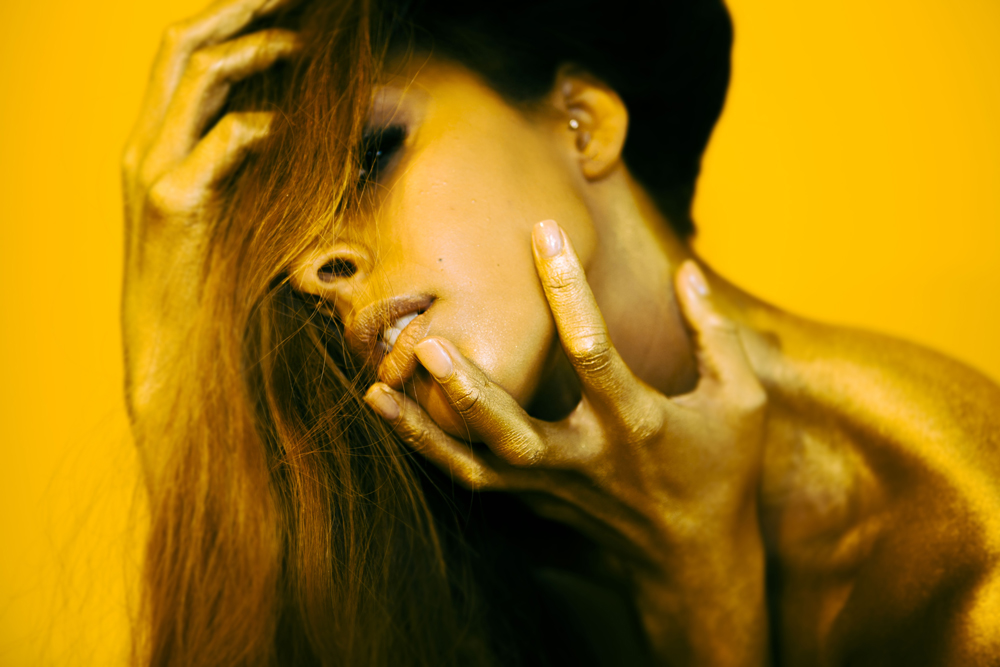
ABOVE: THE GOLDEN HIPPIE. PHOTO COURTESY OF TK ANDERSON.
Marissa Jack believes that we are all golden. Perhaps not on the exterior, or what we reveal in our day-to-day lives, but somewhere under the misleading surface lies a shimmering purity that too often goes unnoticed. Based on this belief, the 26-year-old is in hopes of developing a movement under her stage name, The Golden Hippie.
After years working behind the scenes as a songwriter for Cash Money, Universal, and numerous individual producers, Jack has experienced her fair share of undesired character molding from affected record execs. Her new project is a bold escape from the expectations and opinions of others telling her what her music should sound like or what her image needs to be. This proclamation of individuality first surfaced in her debut track “Smoke Signals,” which gained favorable attention from the blogosphere at large. The Golden Hippie expressed herself more genuinely than ever before, and the world liked it.
Part of the fascination with Jack comes from her close association with Prince, who found the L.A.-based singer through social media and flew her out to meet him. Last year they toured together and he was riveted by her voice and lyrics, which are more profound and didactic than one might assume upon hearing the characteristically up-beat pop beats she sings over. Check out the exclusive premiere of her video for “Human Animal,” as well as our interview with her where she talks about everything from Prince and Paisley Park to the ’60s and the release of her debut album, The Golden Hippie Movement.
MATHIAS ROSENZWEIG: Can you tell me why you chose to go with the name The Golden Hippie rather than your birth name?
MARISSA JACK: I’ve always been this free-spirited person, ever since I was a kid–everything from not wanting to wear shoes outside to just being a person of expression. And my parents are both hippies; they’re kind of crazy and free-spirited as well. Then, when you dissect the word “golden,” it’s just something of value, something that’s eye-catching, something of royalty, and I believe that that’s what the human spirit is. When I look at myself, I look at myself as golden because I see myself in the spirit form, not just the earth form.
It’s not a sense of entitlement, you know. It’s not like, “Oh, I am The Golden Hippie.” I feel like everyone [is] a part of the movement, which is The Golden Hippie Movement. it’s a freedom and expression movement. It’s about capturing who you are in the spiritual form rather than who people see you as.
ROSENZWEIG: Did you set out to have a spiritual side to your music or did that just come out in expressing yourself?
JACK: That absolutely just comes with who I am. I just wanted to have fun on this project. I’ve gone through the whole industry wheel and have been signed to a major label, and kind of been told what to do or who I should sound like-like that I should be urban because I’m black. That kind of thing. And I was like, “I’m going to be who I am entirely.” It wasn’t until I blocked out all of the other opinions and sat down in front of the mirror, literally, and saw past the outside and saw more of my spiritual side that I really figured out my sound.
I was with my friend Danny Mestanza, sitting in my room, writing these songs, and we ended up writing my album in a week because I was actually open. Spiritually open and creatively open. Everything lined up.
ROSENZWEIG: Can you talk about your experience working with Prince?
JACK: Well, we met because we both liked and wanted the same picture of him, of Prince, on Twitter. This fan of his painted this oil painting and I tweeted, “Want that.” I mean, did I really want the oil painting? I don’t know. It was like a gigantic picture of Prince’s face. Next thing you know, I was getting a direct message @3rdEyeGirl–one of my friends has a video of it actually happening, I was in my kitchen–and I dropped down on the ground and was like, “Prince just messaged me on Twitter!” Oh my god, I was freaking out. Next thing you know, I was on a plane to Paisley Park and got to meet him. We discussed all types of music for hours. The second I met him, all nerves, the last bit of fangirl in me that I had, went away and it was like I had known him my entire life.
ROSENZWEIG: Did he help you mold your sound or give you any specific career advice?
JACK: Mainly, he told me to have an identity and never forget that identity, that people should be able to dress like me for Halloween. That’s an artist. Someone who can stand alone and be recognized. Even just off of a color. If you think of the color purple, you think of Prince. If you look at his symbol, you know that that’s him. If I wanted to dress as Prince, I could put on a frilly shirt and permed-out curly hair, or now an afro with like 3-eyed glasses. He’s an icon and spending that time with him definitely helped me understand what it takes to be an icon. It was assurance, for me, that I’m on the right path. He had nothing negative to say. He believed in me and even pulled me up on stage to sing “Paisley Park” in front of 20,000 people in the U.K.
I was talking to him about “Human Animal” and he was asking me what some of the lyrics are, and I was like, “We’re all searching for the righteous way.” He was like, “That’s fantastic because it’s such a bold statement to say that.” People might take it from a religious standpoint with God or trying to be Christian, trying to be this or that, [but] it’s just trying to find the righteous way, the right path, the good way of living, not ripping each other to shreds to be successful but building each other up as a unit. That’s something he absolutely believes in at Paisley Park.
ROSENZWEIG: Do you relate at all to the hippie movement from the ’60s? Do you have roots or inspiration that come from there?
JACK: I do a bit, but not to the sense of all the crazy drugs and things like that. But as far as the freedom protests, that unity they had, yes. Even though some of the hippies were crazy and on all sorts of drugs, they were able to get together and fight for something. That is absolutely what I’m about, minus the crazy drugs.
ROSENZWEIG: Can you pinpoint anything in your life that was happening when you wrote “Human Animal,” or was it just an expression of your general beliefs?
JACK: It just went along with what I was developing. Danny and I were sitting in my room and he brought it up. He was like, “I had a dream and I just thought ‘Human Animal.’ I don’t know what the song is, I don’t know what it will be about, but ‘Human Animal.'” Then I was like, “What about this stupid-ass industry we’re in right now?” Everybody picks each other apart to be that number one person. Everybody bashes each other on social networks. It’s just a cattle-call. It’s crazy, and nobody feels like they can be themselves.
That’s one of the biggest things for me, with all of my songs. Some of them come off as fun, upbeat, pop-driven songs. But at the end of the day, the message behind all of them is being who you are, saying what you want, not being afraid to express yourself, and living life in this life so you can enjoy the next once we pass on. People forget that we don’t live forever. All these songs about being young forever and living forever-they’re great, but not realistic. What are you going to take after? You can’t take your Versace shoes with you, but you can take your spirit. You can take your essence with you, and that’s what we should be trying to build.
ROSENZWEIG: This is the first video you’re releasing for this project in particular. Can you talk about coming up with the visual concept?
JACK: It’s not my first time shooting a video, but it was my first time shooting something that I was like, “Yeah, this is my premiere to the world. This is how I want the world to see me.” Erich Ulbrich and Kylie Eaton were the directors and had this vision. I told him, “I just want to seem like a spiritual freak of nature. I want it to be dark, I want it to be outdoors, and I want to have a group of people kind of in the middle of nowhere picking each other apart.” He came to me with the treatment and that’s exactly what we did. We went out into the boondocks in the middle of nowhere. It took like three and a half hours [to get there]. We were in this van with all the extras who were in the video. We had to go into the mountains in this little cargo van and it looked like where they might have shot Planet of the Apes. There were panicles in the middle of the desert. It definitely worked. I helped direct the part where the extras were kind of beating each other and fighting. I was like, “Make it like The Lost Boys! Go crazy! No mercy! Become animals–release that monster that everyone has inside!” And they started going crazy. It was hilarious to watch. I was like, “See? Look at that. That is how people really are.” You tell people to unleash their inner animal, they go ape-shit crazy, and that’s exactly what happened on the video. We captured it all.
ROSENZWEIG: I read that the album is coming out next fall. What are you working on now?
JACK: We’ve wrapped up a few of the songs, but basically we’re doing this album preview/EP kind of thing in the first quarter of 2015. I don’t want to spill the beans on when the album is set to come out and what’s gonna be on it, but pretty much everything is on its way to being wrapped up and we have a couple surprises.
FOR MORE ON THE GOLDEN HIPPIE, VISIT HER WEBSITE.

